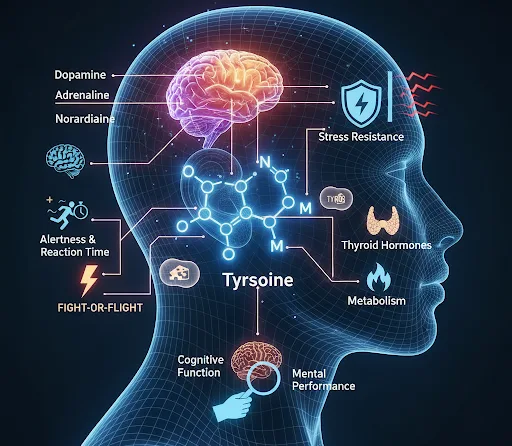Tyrosine is a popular dietary supplement known for its ability to improve alertness, attention, and focus. Naturally produced in the body from the amino acid phenylalanine, it plays a crucial role in creating important brain chemicals that help nerve cells communicate and may even regulate mood.
Despite its benefits, it's important to understand the full picture, including its potential side effects and interactions with certain medications. This article breaks down everything you need to know about tyrosine, its benefits, side effects, and recommended dosages.
What Is Tyrosine and What Does It Do?
Tyrosine is an amino acid found in many high-protein foods, including chicken, turkey, fish, dairy products, and especially cheese, where it was first discovered. In fact, its name comes from the Greek word "tyros," meaning "cheese."
Tyrosine helps the body produce several vital substances, including:
Dopamine: This neurotransmitter is a key component of your brain's reward and pleasure centers. It is also essential for memory and motor skills.
Adrenaline and Noradrenaline: These hormones are central to the body's "fight-or-flight" response, preparing you to react to perceived threats.
Thyroid Hormones: Produced by the thyroid gland, these hormones are primarily responsible for regulating metabolism.
Melanin: This pigment gives your skin, hair, and eyes their color.
As a dietary supplement, tyrosine is thought to increase levels of these neurotransmitters. By doing so, it may help improve memory and performance in stressful situations.
Tyrosine and Mental Performance in Stressful Situations
Stress can negatively impact reasoning, memory, and attention by depleting key neurotransmitters. Research suggests that tyrosine supplementation may help counteract this mental decline.
Improved Working Memory: In one study, tyrosine significantly improved working memory in women performing a mentally demanding task, compared to a placebo.
Enhanced Cognitive Flexibility: A similar study found that tyrosine improved cognitive flexibility—the ability to switch between tasks or thoughts—in participants.
Counteracting Sleep Deprivation: A single dose of tyrosine has been shown to help individuals who were sleep-deprived stay alert for three hours longer than they otherwise would.
Two comprehensive reviews have concluded that supplementing with tyrosine can reverse mental decline and improve cognitive function in short-term, stressful, or mentally demanding situations. It's important to note, however, that there is no evidence that tyrosine enhances physical performance or improves mental performance in the absence of a stressor. In other words, it won't increase your general brainpower.
Potential Uses and Mixed Evidence
Phenylketonuria (PKU): PKU is a rare genetic condition where the body cannot convert phenylalanine into tyrosine, leading to a potential tyrosine deficiency. While supplementing with tyrosine has been suggested to alleviate behavioral symptoms, studies have yielded mixed results, and more research is needed before official recommendations can be made.
Depression: It is theorized that because tyrosine can increase the production of neurotransmitters that affect mood, it may act as an antidepressant. However, current research does not support supplementing with tyrosine to treat general symptoms of depression. While one study showed benefits for individuals with dopamine-deficient depression (characterized by low energy and lack of motivation), this is not a widespread effect.
Side Effects and Safety
Tyrosine is generally recognized as safe (GRAS) by the Food and Drug Administration. It has been safely supplemented at doses of up to 150 mg per kg of body weight per day for three months.
However, caution is warranted due to potential side effects and drug interactions:
Monoamine Oxidase Inhibitors (MAOIs): Tyrosine can be converted into tyramine, which helps regulate blood pressure. For individuals taking MAOIs (a class of antidepressants that block tyramine breakdown), combining them with high-tyramine foods can cause a dangerous spike in blood pressure. While it is not certain if tyrosine supplements have the same effect, caution is advised.
Thyroid Hormone: Tyrosine is a building block for thyroid hormones. Therefore, individuals with an overactive thyroid or those taking thyroid medications should be cautious, as supplementation could raise hormone levels too high.
Levodopa (L-dopa): This medication for Parkinson’s disease and tyrosine compete for absorption in the small intestine. Doses should be separated by several hours to avoid interfering with the drug’s effectiveness.
How to Supplement with Tyrosine
Tyrosine is available as a free-form amino acid or as N-acetyl L-tyrosine (NALT). The free-form amino acid is the preferred choice because NALT has a low conversion rate in the body.
Dosage: The most significant anti-stress effects are observed with doses ranging from 100–150 mg per kg of body weight, taken about 60 minutes before a stressful event. For a 150-pound (68.2 kg) person, this would be 7–10 grams.
Timing: These higher doses may cause gastrointestinal upset and can be split into two separate doses, taken 30 and 60 minutes before a stressful event.
Exercise: While tyrosine is commonly taken in doses of 500–2,000 mg 30–60 minutes before exercise, its benefits for physical performance remain inconclusive.

